AMP Case Study: ASIC Misleading & Financial Service Ethics
VerifiedAdded on 2023/06/13
|26
|7566
|116
Case Study
AI Summary
This case study delves into the ethical implications of AMP's misleading conduct towards the Australian Securities and Investments Commission (ASIC). The analysis focuses on an article discussing how AMP charged fees for financial advice that was never provided, impacting a significant number of customers. The study identifies key ethical issues, including the abuse of the lack of a dominant professional association, prioritization of revenue over client interests, and breaches of ethical theories such as utilitarianism and Kantian ethics. Proposed resolutions include enhanced education requirements for financial advisors and the establishment of a robust code of ethics supported by a strong professional body. The case study also identifies various stakeholders affected by AMP's actions, including customers, other financial institutions, ASIC, prospective customers, and employees. Ultimately, the analysis underscores the importance of ethical conduct and regulatory compliance in the financial services sector.
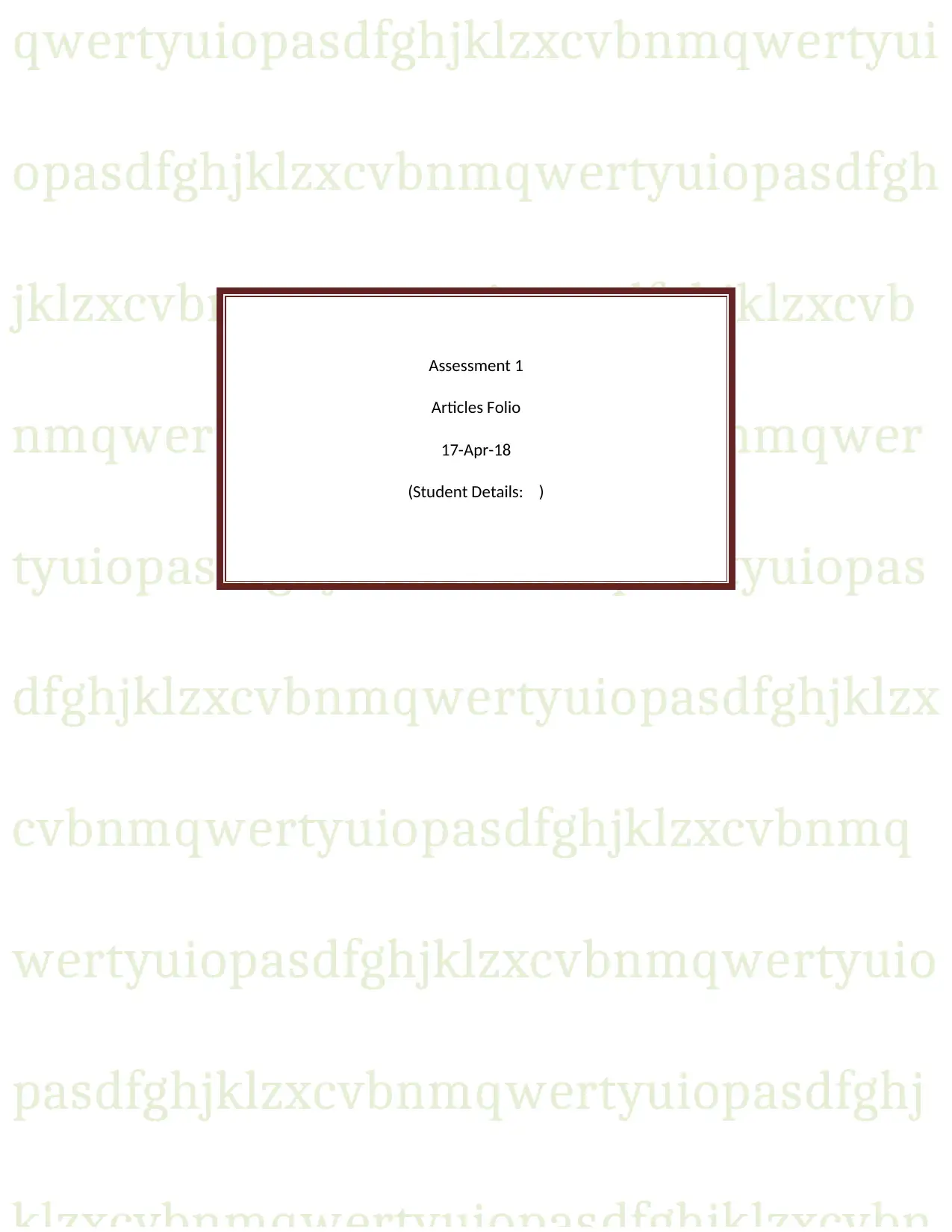
qwertyuiopasdfghjklzxcvbnmqwertyui
opasdfghjklzxcvbnmqwertyuiopasdfgh
jklzxcvbnmqwertyuiopasdfghjklzxcvb
nmqwertyuiopasdfghjklzxcvbnmqwer
tyuiopasdfghjklzxcvbnmqwertyuiopas
dfghjklzxcvbnmqwertyuiopasdfghjklzx
cvbnmqwertyuiopasdfghjklzxcvbnmq
wertyuiopasdfghjklzxcvbnmqwertyuio
pasdfghjklzxcvbnmqwertyuiopasdfghj
Assessment 1
Articles Folio
17-Apr-18
(Student Details: )
opasdfghjklzxcvbnmqwertyuiopasdfgh
jklzxcvbnmqwertyuiopasdfghjklzxcvb
nmqwertyuiopasdfghjklzxcvbnmqwer
tyuiopasdfghjklzxcvbnmqwertyuiopas
dfghjklzxcvbnmqwertyuiopasdfghjklzx
cvbnmqwertyuiopasdfghjklzxcvbnmq
wertyuiopasdfghjklzxcvbnmqwertyuio
pasdfghjklzxcvbnmqwertyuiopasdfghj
Assessment 1
Articles Folio
17-Apr-18
(Student Details: )
Paraphrase This Document
Need a fresh take? Get an instant paraphrase of this document with our AI Paraphraser
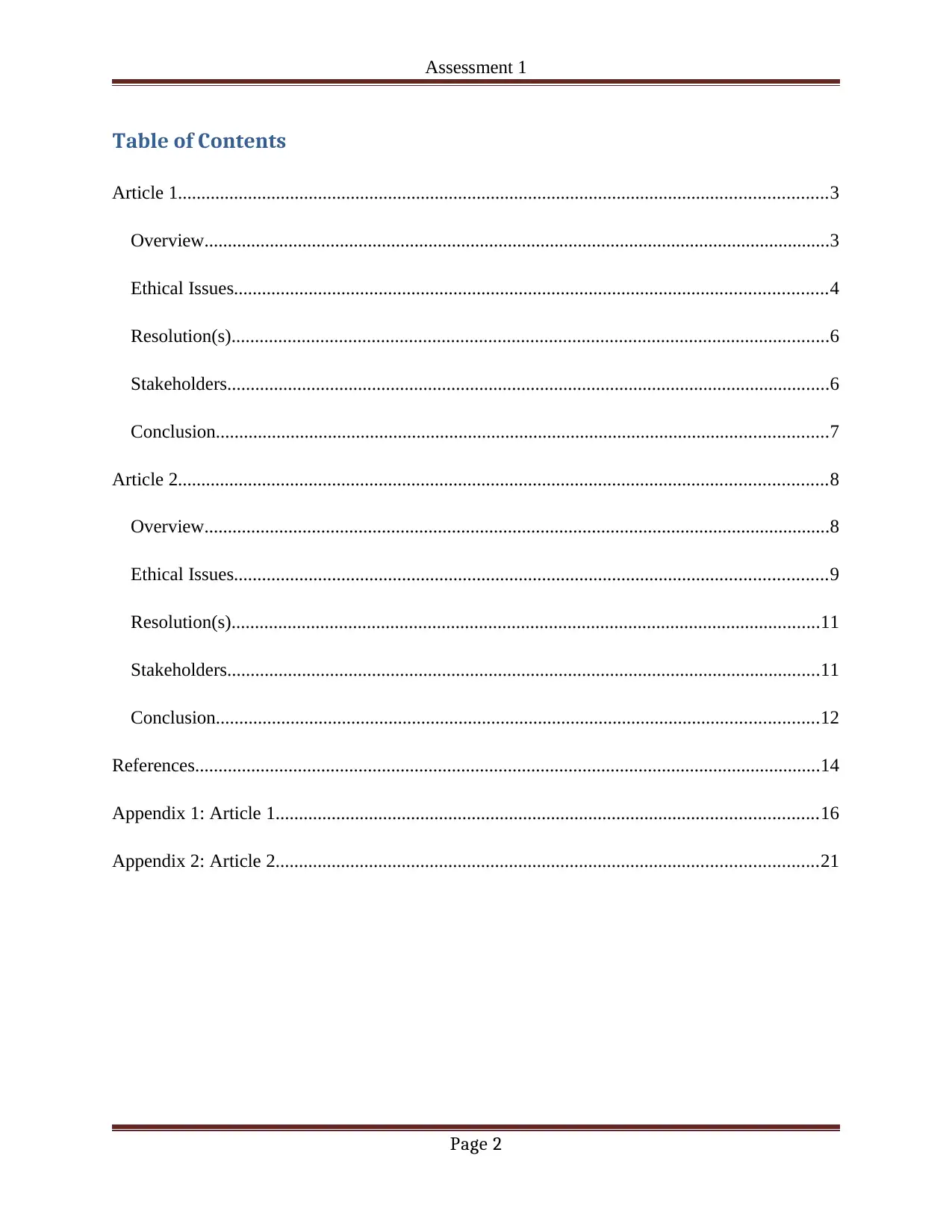
Assessment 1
Table of Contents
Article 1...........................................................................................................................................3
Overview......................................................................................................................................3
Ethical Issues...............................................................................................................................4
Resolution(s)................................................................................................................................6
Stakeholders.................................................................................................................................6
Conclusion...................................................................................................................................7
Article 2...........................................................................................................................................8
Overview......................................................................................................................................8
Ethical Issues...............................................................................................................................9
Resolution(s)..............................................................................................................................11
Stakeholders...............................................................................................................................11
Conclusion.................................................................................................................................12
References......................................................................................................................................14
Appendix 1: Article 1....................................................................................................................16
Appendix 2: Article 2....................................................................................................................21
Page 2
Table of Contents
Article 1...........................................................................................................................................3
Overview......................................................................................................................................3
Ethical Issues...............................................................................................................................4
Resolution(s)................................................................................................................................6
Stakeholders.................................................................................................................................6
Conclusion...................................................................................................................................7
Article 2...........................................................................................................................................8
Overview......................................................................................................................................8
Ethical Issues...............................................................................................................................9
Resolution(s)..............................................................................................................................11
Stakeholders...............................................................................................................................11
Conclusion.................................................................................................................................12
References......................................................................................................................................14
Appendix 1: Article 1....................................................................................................................16
Appendix 2: Article 2....................................................................................................................21
Page 2
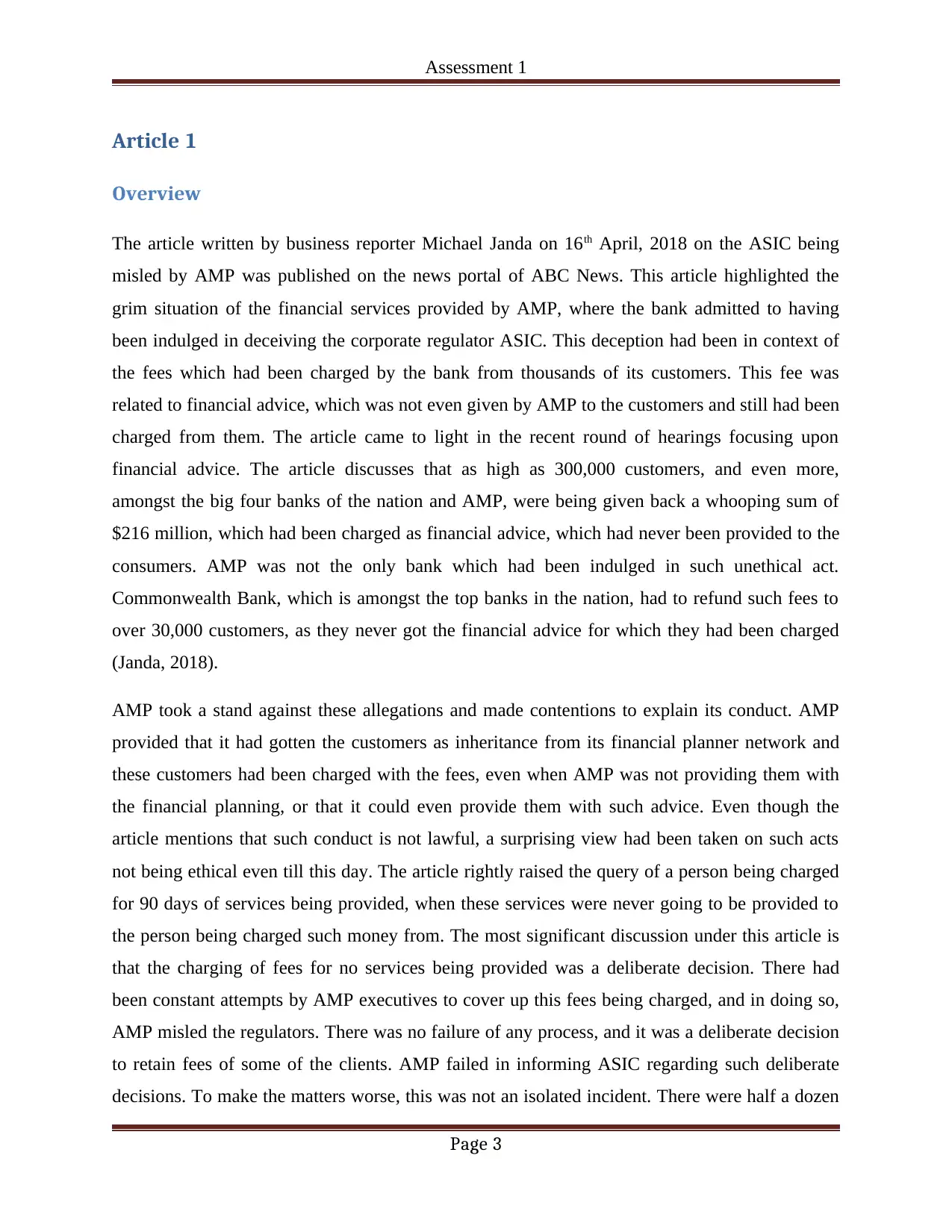
Assessment 1
Article 1
Overview
The article written by business reporter Michael Janda on 16th April, 2018 on the ASIC being
misled by AMP was published on the news portal of ABC News. This article highlighted the
grim situation of the financial services provided by AMP, where the bank admitted to having
been indulged in deceiving the corporate regulator ASIC. This deception had been in context of
the fees which had been charged by the bank from thousands of its customers. This fee was
related to financial advice, which was not even given by AMP to the customers and still had been
charged from them. The article came to light in the recent round of hearings focusing upon
financial advice. The article discusses that as high as 300,000 customers, and even more,
amongst the big four banks of the nation and AMP, were being given back a whooping sum of
$216 million, which had been charged as financial advice, which had never been provided to the
consumers. AMP was not the only bank which had been indulged in such unethical act.
Commonwealth Bank, which is amongst the top banks in the nation, had to refund such fees to
over 30,000 customers, as they never got the financial advice for which they had been charged
(Janda, 2018).
AMP took a stand against these allegations and made contentions to explain its conduct. AMP
provided that it had gotten the customers as inheritance from its financial planner network and
these customers had been charged with the fees, even when AMP was not providing them with
the financial planning, or that it could even provide them with such advice. Even though the
article mentions that such conduct is not lawful, a surprising view had been taken on such acts
not being ethical even till this day. The article rightly raised the query of a person being charged
for 90 days of services being provided, when these services were never going to be provided to
the person being charged such money from. The most significant discussion under this article is
that the charging of fees for no services being provided was a deliberate decision. There had
been constant attempts by AMP executives to cover up this fees being charged, and in doing so,
AMP misled the regulators. There was no failure of any process, and it was a deliberate decision
to retain fees of some of the clients. AMP failed in informing ASIC regarding such deliberate
decisions. To make the matters worse, this was not an isolated incident. There were half a dozen
Page 3
Article 1
Overview
The article written by business reporter Michael Janda on 16th April, 2018 on the ASIC being
misled by AMP was published on the news portal of ABC News. This article highlighted the
grim situation of the financial services provided by AMP, where the bank admitted to having
been indulged in deceiving the corporate regulator ASIC. This deception had been in context of
the fees which had been charged by the bank from thousands of its customers. This fee was
related to financial advice, which was not even given by AMP to the customers and still had been
charged from them. The article came to light in the recent round of hearings focusing upon
financial advice. The article discusses that as high as 300,000 customers, and even more,
amongst the big four banks of the nation and AMP, were being given back a whooping sum of
$216 million, which had been charged as financial advice, which had never been provided to the
consumers. AMP was not the only bank which had been indulged in such unethical act.
Commonwealth Bank, which is amongst the top banks in the nation, had to refund such fees to
over 30,000 customers, as they never got the financial advice for which they had been charged
(Janda, 2018).
AMP took a stand against these allegations and made contentions to explain its conduct. AMP
provided that it had gotten the customers as inheritance from its financial planner network and
these customers had been charged with the fees, even when AMP was not providing them with
the financial planning, or that it could even provide them with such advice. Even though the
article mentions that such conduct is not lawful, a surprising view had been taken on such acts
not being ethical even till this day. The article rightly raised the query of a person being charged
for 90 days of services being provided, when these services were never going to be provided to
the person being charged such money from. The most significant discussion under this article is
that the charging of fees for no services being provided was a deliberate decision. There had
been constant attempts by AMP executives to cover up this fees being charged, and in doing so,
AMP misled the regulators. There was no failure of any process, and it was a deliberate decision
to retain fees of some of the clients. AMP failed in informing ASIC regarding such deliberate
decisions. To make the matters worse, this was not an isolated incident. There were half a dozen
Page 3
⊘ This is a preview!⊘
Do you want full access?
Subscribe today to unlock all pages.

Trusted by 1+ million students worldwide
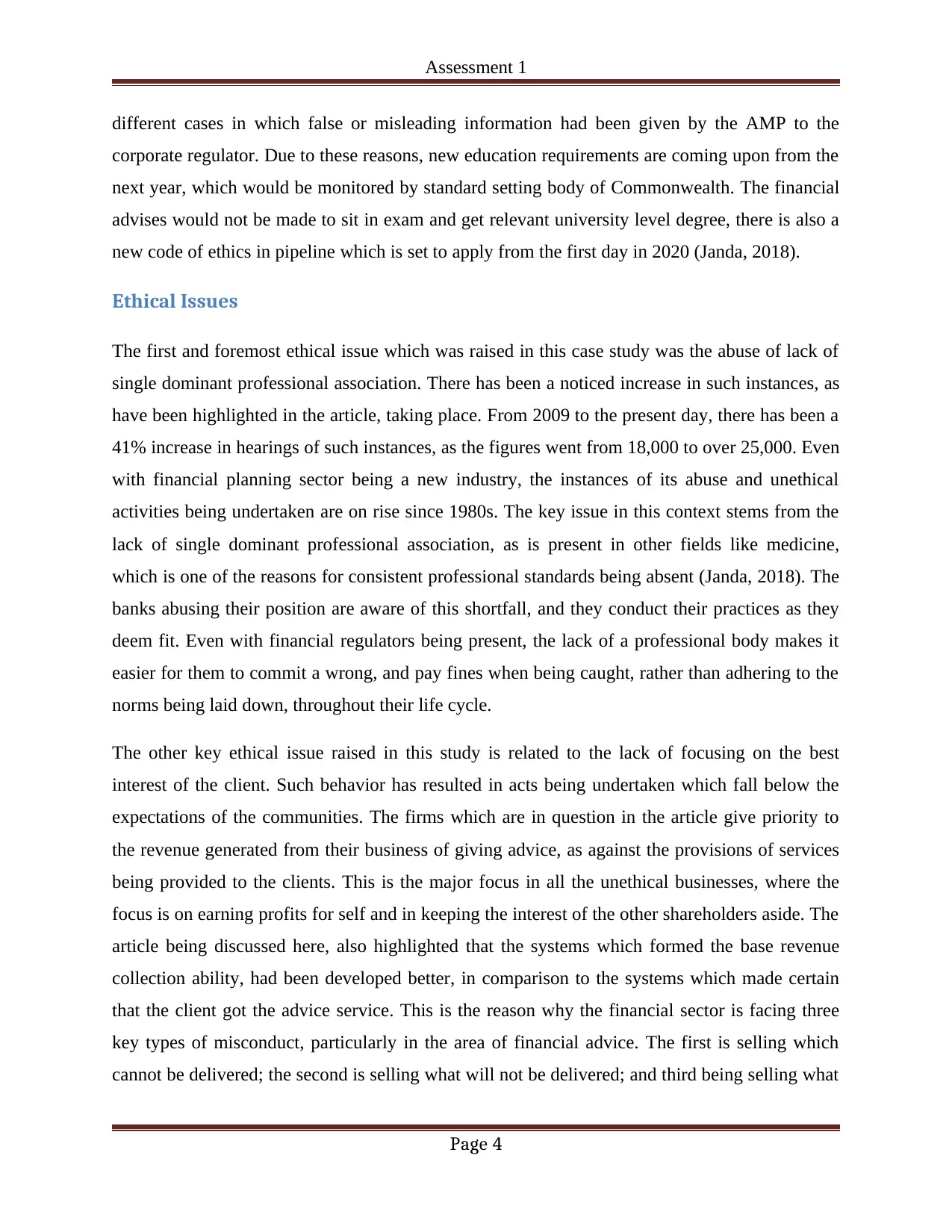
Assessment 1
different cases in which false or misleading information had been given by the AMP to the
corporate regulator. Due to these reasons, new education requirements are coming upon from the
next year, which would be monitored by standard setting body of Commonwealth. The financial
advises would not be made to sit in exam and get relevant university level degree, there is also a
new code of ethics in pipeline which is set to apply from the first day in 2020 (Janda, 2018).
Ethical Issues
The first and foremost ethical issue which was raised in this case study was the abuse of lack of
single dominant professional association. There has been a noticed increase in such instances, as
have been highlighted in the article, taking place. From 2009 to the present day, there has been a
41% increase in hearings of such instances, as the figures went from 18,000 to over 25,000. Even
with financial planning sector being a new industry, the instances of its abuse and unethical
activities being undertaken are on rise since 1980s. The key issue in this context stems from the
lack of single dominant professional association, as is present in other fields like medicine,
which is one of the reasons for consistent professional standards being absent (Janda, 2018). The
banks abusing their position are aware of this shortfall, and they conduct their practices as they
deem fit. Even with financial regulators being present, the lack of a professional body makes it
easier for them to commit a wrong, and pay fines when being caught, rather than adhering to the
norms being laid down, throughout their life cycle.
The other key ethical issue raised in this study is related to the lack of focusing on the best
interest of the client. Such behavior has resulted in acts being undertaken which fall below the
expectations of the communities. The firms which are in question in the article give priority to
the revenue generated from their business of giving advice, as against the provisions of services
being provided to the clients. This is the major focus in all the unethical businesses, where the
focus is on earning profits for self and in keeping the interest of the other shareholders aside. The
article being discussed here, also highlighted that the systems which formed the base revenue
collection ability, had been developed better, in comparison to the systems which made certain
that the client got the advice service. This is the reason why the financial sector is facing three
key types of misconduct, particularly in the area of financial advice. The first is selling which
cannot be delivered; the second is selling what will not be delivered; and third being selling what
Page 4
different cases in which false or misleading information had been given by the AMP to the
corporate regulator. Due to these reasons, new education requirements are coming upon from the
next year, which would be monitored by standard setting body of Commonwealth. The financial
advises would not be made to sit in exam and get relevant university level degree, there is also a
new code of ethics in pipeline which is set to apply from the first day in 2020 (Janda, 2018).
Ethical Issues
The first and foremost ethical issue which was raised in this case study was the abuse of lack of
single dominant professional association. There has been a noticed increase in such instances, as
have been highlighted in the article, taking place. From 2009 to the present day, there has been a
41% increase in hearings of such instances, as the figures went from 18,000 to over 25,000. Even
with financial planning sector being a new industry, the instances of its abuse and unethical
activities being undertaken are on rise since 1980s. The key issue in this context stems from the
lack of single dominant professional association, as is present in other fields like medicine,
which is one of the reasons for consistent professional standards being absent (Janda, 2018). The
banks abusing their position are aware of this shortfall, and they conduct their practices as they
deem fit. Even with financial regulators being present, the lack of a professional body makes it
easier for them to commit a wrong, and pay fines when being caught, rather than adhering to the
norms being laid down, throughout their life cycle.
The other key ethical issue raised in this study is related to the lack of focusing on the best
interest of the client. Such behavior has resulted in acts being undertaken which fall below the
expectations of the communities. The firms which are in question in the article give priority to
the revenue generated from their business of giving advice, as against the provisions of services
being provided to the clients. This is the major focus in all the unethical businesses, where the
focus is on earning profits for self and in keeping the interest of the other shareholders aside. The
article being discussed here, also highlighted that the systems which formed the base revenue
collection ability, had been developed better, in comparison to the systems which made certain
that the client got the advice service. This is the reason why the financial sector is facing three
key types of misconduct, particularly in the area of financial advice. The first is selling which
cannot be delivered; the second is selling what will not be delivered; and third being selling what
Page 4
Paraphrase This Document
Need a fresh take? Get an instant paraphrase of this document with our AI Paraphraser
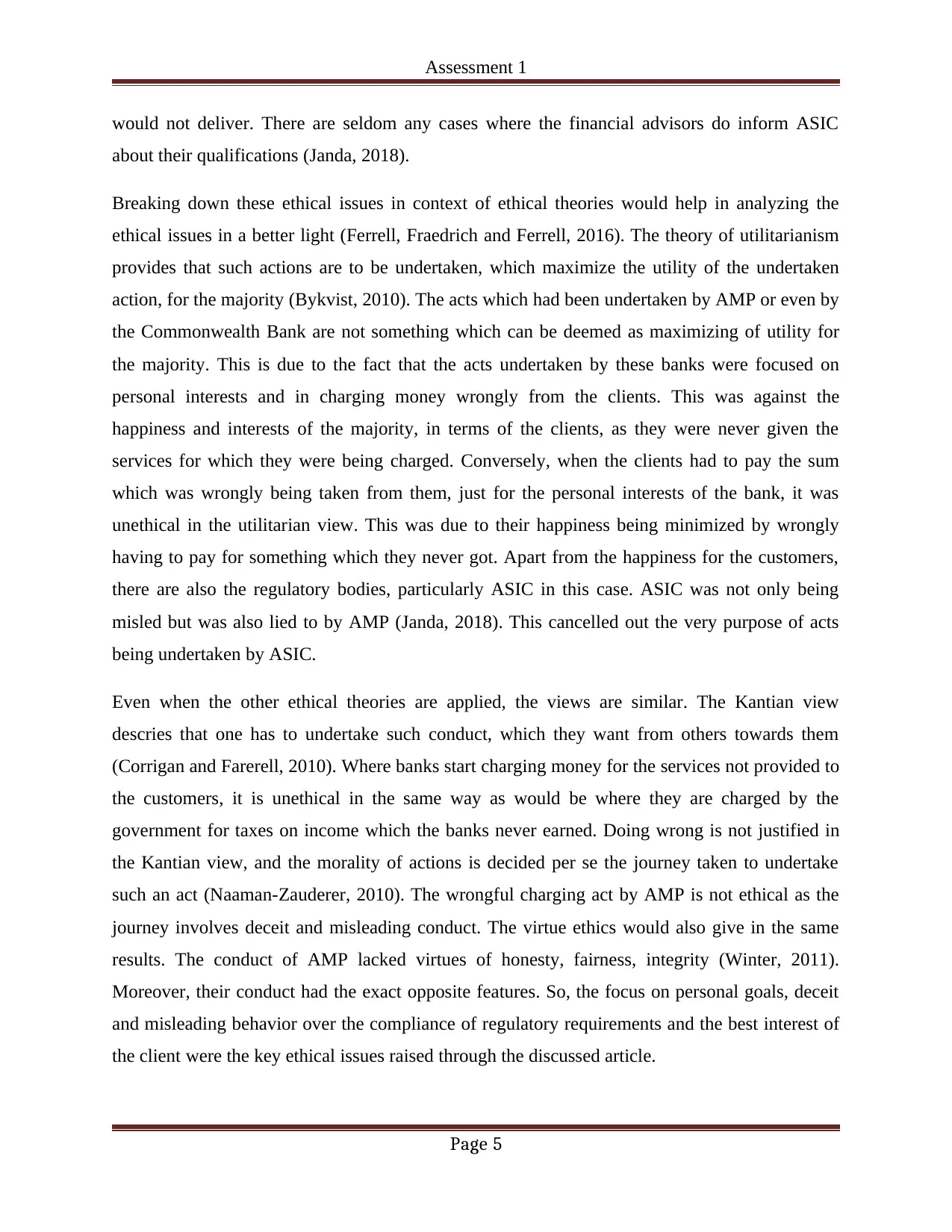
Assessment 1
would not deliver. There are seldom any cases where the financial advisors do inform ASIC
about their qualifications (Janda, 2018).
Breaking down these ethical issues in context of ethical theories would help in analyzing the
ethical issues in a better light (Ferrell, Fraedrich and Ferrell, 2016). The theory of utilitarianism
provides that such actions are to be undertaken, which maximize the utility of the undertaken
action, for the majority (Bykvist, 2010). The acts which had been undertaken by AMP or even by
the Commonwealth Bank are not something which can be deemed as maximizing of utility for
the majority. This is due to the fact that the acts undertaken by these banks were focused on
personal interests and in charging money wrongly from the clients. This was against the
happiness and interests of the majority, in terms of the clients, as they were never given the
services for which they were being charged. Conversely, when the clients had to pay the sum
which was wrongly being taken from them, just for the personal interests of the bank, it was
unethical in the utilitarian view. This was due to their happiness being minimized by wrongly
having to pay for something which they never got. Apart from the happiness for the customers,
there are also the regulatory bodies, particularly ASIC in this case. ASIC was not only being
misled but was also lied to by AMP (Janda, 2018). This cancelled out the very purpose of acts
being undertaken by ASIC.
Even when the other ethical theories are applied, the views are similar. The Kantian view
descries that one has to undertake such conduct, which they want from others towards them
(Corrigan and Farerell, 2010). Where banks start charging money for the services not provided to
the customers, it is unethical in the same way as would be where they are charged by the
government for taxes on income which the banks never earned. Doing wrong is not justified in
the Kantian view, and the morality of actions is decided per se the journey taken to undertake
such an act (Naaman-Zauderer, 2010). The wrongful charging act by AMP is not ethical as the
journey involves deceit and misleading conduct. The virtue ethics would also give in the same
results. The conduct of AMP lacked virtues of honesty, fairness, integrity (Winter, 2011).
Moreover, their conduct had the exact opposite features. So, the focus on personal goals, deceit
and misleading behavior over the compliance of regulatory requirements and the best interest of
the client were the key ethical issues raised through the discussed article.
Page 5
would not deliver. There are seldom any cases where the financial advisors do inform ASIC
about their qualifications (Janda, 2018).
Breaking down these ethical issues in context of ethical theories would help in analyzing the
ethical issues in a better light (Ferrell, Fraedrich and Ferrell, 2016). The theory of utilitarianism
provides that such actions are to be undertaken, which maximize the utility of the undertaken
action, for the majority (Bykvist, 2010). The acts which had been undertaken by AMP or even by
the Commonwealth Bank are not something which can be deemed as maximizing of utility for
the majority. This is due to the fact that the acts undertaken by these banks were focused on
personal interests and in charging money wrongly from the clients. This was against the
happiness and interests of the majority, in terms of the clients, as they were never given the
services for which they were being charged. Conversely, when the clients had to pay the sum
which was wrongly being taken from them, just for the personal interests of the bank, it was
unethical in the utilitarian view. This was due to their happiness being minimized by wrongly
having to pay for something which they never got. Apart from the happiness for the customers,
there are also the regulatory bodies, particularly ASIC in this case. ASIC was not only being
misled but was also lied to by AMP (Janda, 2018). This cancelled out the very purpose of acts
being undertaken by ASIC.
Even when the other ethical theories are applied, the views are similar. The Kantian view
descries that one has to undertake such conduct, which they want from others towards them
(Corrigan and Farerell, 2010). Where banks start charging money for the services not provided to
the customers, it is unethical in the same way as would be where they are charged by the
government for taxes on income which the banks never earned. Doing wrong is not justified in
the Kantian view, and the morality of actions is decided per se the journey taken to undertake
such an act (Naaman-Zauderer, 2010). The wrongful charging act by AMP is not ethical as the
journey involves deceit and misleading conduct. The virtue ethics would also give in the same
results. The conduct of AMP lacked virtues of honesty, fairness, integrity (Winter, 2011).
Moreover, their conduct had the exact opposite features. So, the focus on personal goals, deceit
and misleading behavior over the compliance of regulatory requirements and the best interest of
the client were the key ethical issues raised through the discussed article.
Page 5
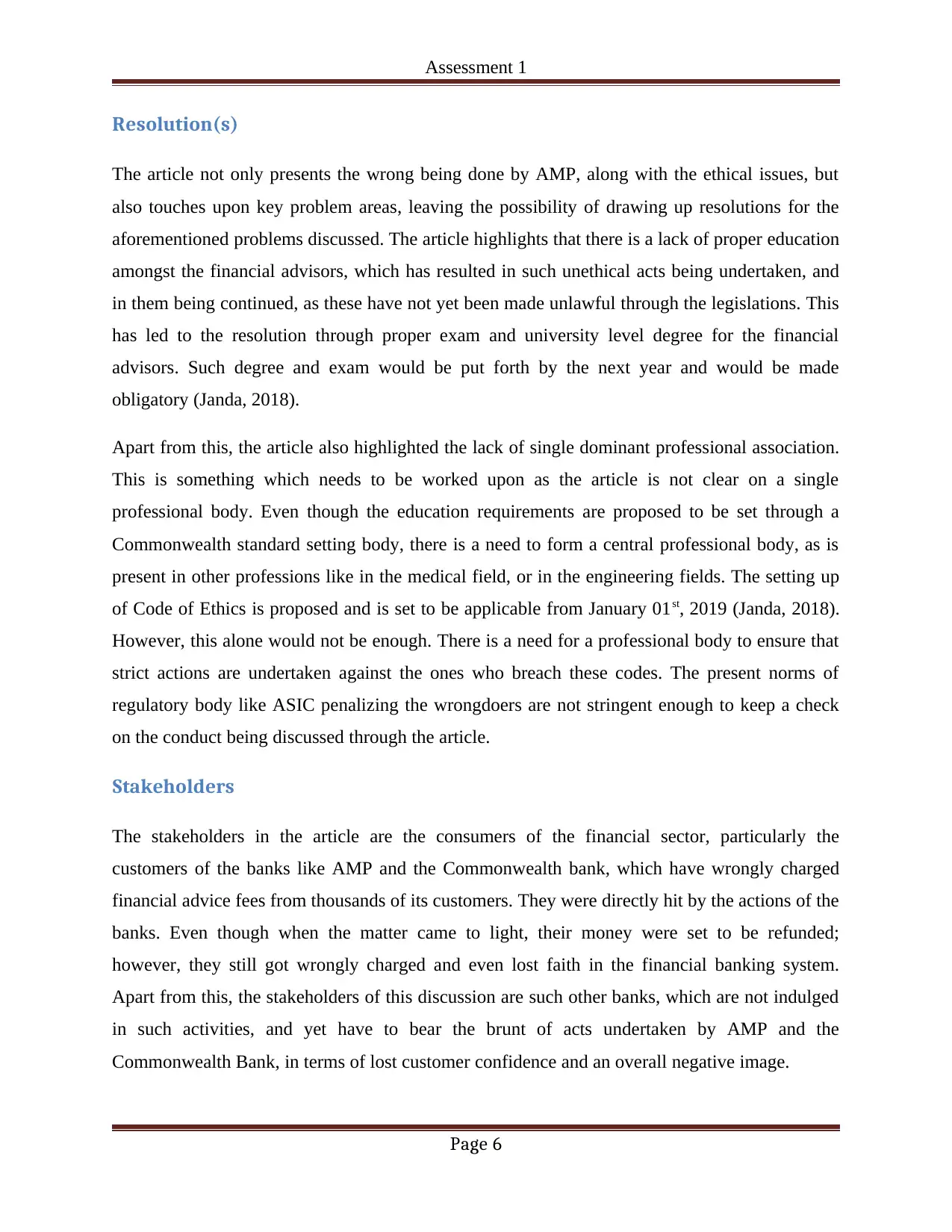
Assessment 1
Resolution(s)
The article not only presents the wrong being done by AMP, along with the ethical issues, but
also touches upon key problem areas, leaving the possibility of drawing up resolutions for the
aforementioned problems discussed. The article highlights that there is a lack of proper education
amongst the financial advisors, which has resulted in such unethical acts being undertaken, and
in them being continued, as these have not yet been made unlawful through the legislations. This
has led to the resolution through proper exam and university level degree for the financial
advisors. Such degree and exam would be put forth by the next year and would be made
obligatory (Janda, 2018).
Apart from this, the article also highlighted the lack of single dominant professional association.
This is something which needs to be worked upon as the article is not clear on a single
professional body. Even though the education requirements are proposed to be set through a
Commonwealth standard setting body, there is a need to form a central professional body, as is
present in other professions like in the medical field, or in the engineering fields. The setting up
of Code of Ethics is proposed and is set to be applicable from January 01st, 2019 (Janda, 2018).
However, this alone would not be enough. There is a need for a professional body to ensure that
strict actions are undertaken against the ones who breach these codes. The present norms of
regulatory body like ASIC penalizing the wrongdoers are not stringent enough to keep a check
on the conduct being discussed through the article.
Stakeholders
The stakeholders in the article are the consumers of the financial sector, particularly the
customers of the banks like AMP and the Commonwealth bank, which have wrongly charged
financial advice fees from thousands of its customers. They were directly hit by the actions of the
banks. Even though when the matter came to light, their money were set to be refunded;
however, they still got wrongly charged and even lost faith in the financial banking system.
Apart from this, the stakeholders of this discussion are such other banks, which are not indulged
in such activities, and yet have to bear the brunt of acts undertaken by AMP and the
Commonwealth Bank, in terms of lost customer confidence and an overall negative image.
Page 6
Resolution(s)
The article not only presents the wrong being done by AMP, along with the ethical issues, but
also touches upon key problem areas, leaving the possibility of drawing up resolutions for the
aforementioned problems discussed. The article highlights that there is a lack of proper education
amongst the financial advisors, which has resulted in such unethical acts being undertaken, and
in them being continued, as these have not yet been made unlawful through the legislations. This
has led to the resolution through proper exam and university level degree for the financial
advisors. Such degree and exam would be put forth by the next year and would be made
obligatory (Janda, 2018).
Apart from this, the article also highlighted the lack of single dominant professional association.
This is something which needs to be worked upon as the article is not clear on a single
professional body. Even though the education requirements are proposed to be set through a
Commonwealth standard setting body, there is a need to form a central professional body, as is
present in other professions like in the medical field, or in the engineering fields. The setting up
of Code of Ethics is proposed and is set to be applicable from January 01st, 2019 (Janda, 2018).
However, this alone would not be enough. There is a need for a professional body to ensure that
strict actions are undertaken against the ones who breach these codes. The present norms of
regulatory body like ASIC penalizing the wrongdoers are not stringent enough to keep a check
on the conduct being discussed through the article.
Stakeholders
The stakeholders in the article are the consumers of the financial sector, particularly the
customers of the banks like AMP and the Commonwealth bank, which have wrongly charged
financial advice fees from thousands of its customers. They were directly hit by the actions of the
banks. Even though when the matter came to light, their money were set to be refunded;
however, they still got wrongly charged and even lost faith in the financial banking system.
Apart from this, the stakeholders of this discussion are such other banks, which are not indulged
in such activities, and yet have to bear the brunt of acts undertaken by AMP and the
Commonwealth Bank, in terms of lost customer confidence and an overall negative image.
Page 6
⊘ This is a preview!⊘
Do you want full access?
Subscribe today to unlock all pages.

Trusted by 1+ million students worldwide
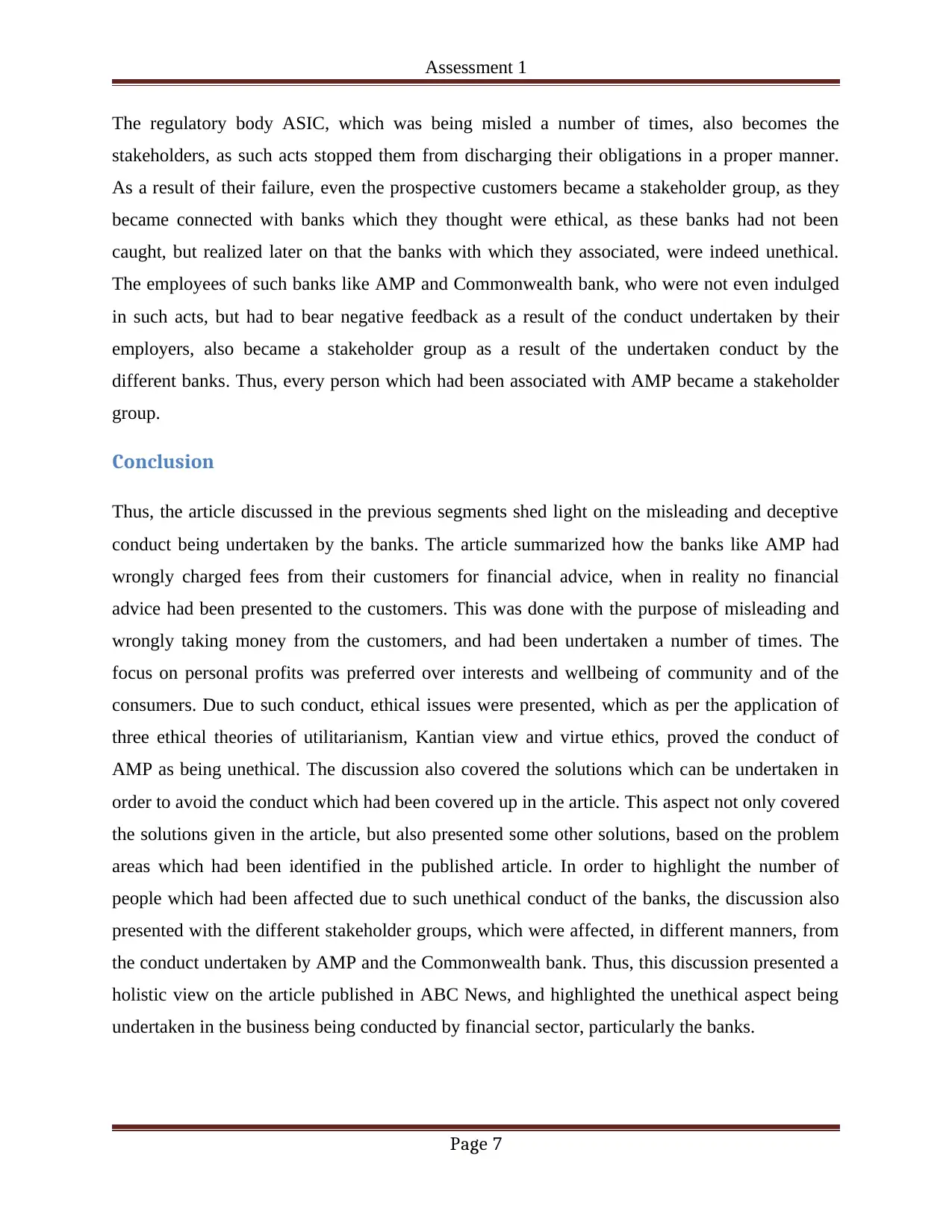
Assessment 1
The regulatory body ASIC, which was being misled a number of times, also becomes the
stakeholders, as such acts stopped them from discharging their obligations in a proper manner.
As a result of their failure, even the prospective customers became a stakeholder group, as they
became connected with banks which they thought were ethical, as these banks had not been
caught, but realized later on that the banks with which they associated, were indeed unethical.
The employees of such banks like AMP and Commonwealth bank, who were not even indulged
in such acts, but had to bear negative feedback as a result of the conduct undertaken by their
employers, also became a stakeholder group as a result of the undertaken conduct by the
different banks. Thus, every person which had been associated with AMP became a stakeholder
group.
Conclusion
Thus, the article discussed in the previous segments shed light on the misleading and deceptive
conduct being undertaken by the banks. The article summarized how the banks like AMP had
wrongly charged fees from their customers for financial advice, when in reality no financial
advice had been presented to the customers. This was done with the purpose of misleading and
wrongly taking money from the customers, and had been undertaken a number of times. The
focus on personal profits was preferred over interests and wellbeing of community and of the
consumers. Due to such conduct, ethical issues were presented, which as per the application of
three ethical theories of utilitarianism, Kantian view and virtue ethics, proved the conduct of
AMP as being unethical. The discussion also covered the solutions which can be undertaken in
order to avoid the conduct which had been covered up in the article. This aspect not only covered
the solutions given in the article, but also presented some other solutions, based on the problem
areas which had been identified in the published article. In order to highlight the number of
people which had been affected due to such unethical conduct of the banks, the discussion also
presented with the different stakeholder groups, which were affected, in different manners, from
the conduct undertaken by AMP and the Commonwealth bank. Thus, this discussion presented a
holistic view on the article published in ABC News, and highlighted the unethical aspect being
undertaken in the business being conducted by financial sector, particularly the banks.
Page 7
The regulatory body ASIC, which was being misled a number of times, also becomes the
stakeholders, as such acts stopped them from discharging their obligations in a proper manner.
As a result of their failure, even the prospective customers became a stakeholder group, as they
became connected with banks which they thought were ethical, as these banks had not been
caught, but realized later on that the banks with which they associated, were indeed unethical.
The employees of such banks like AMP and Commonwealth bank, who were not even indulged
in such acts, but had to bear negative feedback as a result of the conduct undertaken by their
employers, also became a stakeholder group as a result of the undertaken conduct by the
different banks. Thus, every person which had been associated with AMP became a stakeholder
group.
Conclusion
Thus, the article discussed in the previous segments shed light on the misleading and deceptive
conduct being undertaken by the banks. The article summarized how the banks like AMP had
wrongly charged fees from their customers for financial advice, when in reality no financial
advice had been presented to the customers. This was done with the purpose of misleading and
wrongly taking money from the customers, and had been undertaken a number of times. The
focus on personal profits was preferred over interests and wellbeing of community and of the
consumers. Due to such conduct, ethical issues were presented, which as per the application of
three ethical theories of utilitarianism, Kantian view and virtue ethics, proved the conduct of
AMP as being unethical. The discussion also covered the solutions which can be undertaken in
order to avoid the conduct which had been covered up in the article. This aspect not only covered
the solutions given in the article, but also presented some other solutions, based on the problem
areas which had been identified in the published article. In order to highlight the number of
people which had been affected due to such unethical conduct of the banks, the discussion also
presented with the different stakeholder groups, which were affected, in different manners, from
the conduct undertaken by AMP and the Commonwealth bank. Thus, this discussion presented a
holistic view on the article published in ABC News, and highlighted the unethical aspect being
undertaken in the business being conducted by financial sector, particularly the banks.
Page 7
Paraphrase This Document
Need a fresh take? Get an instant paraphrase of this document with our AI Paraphraser
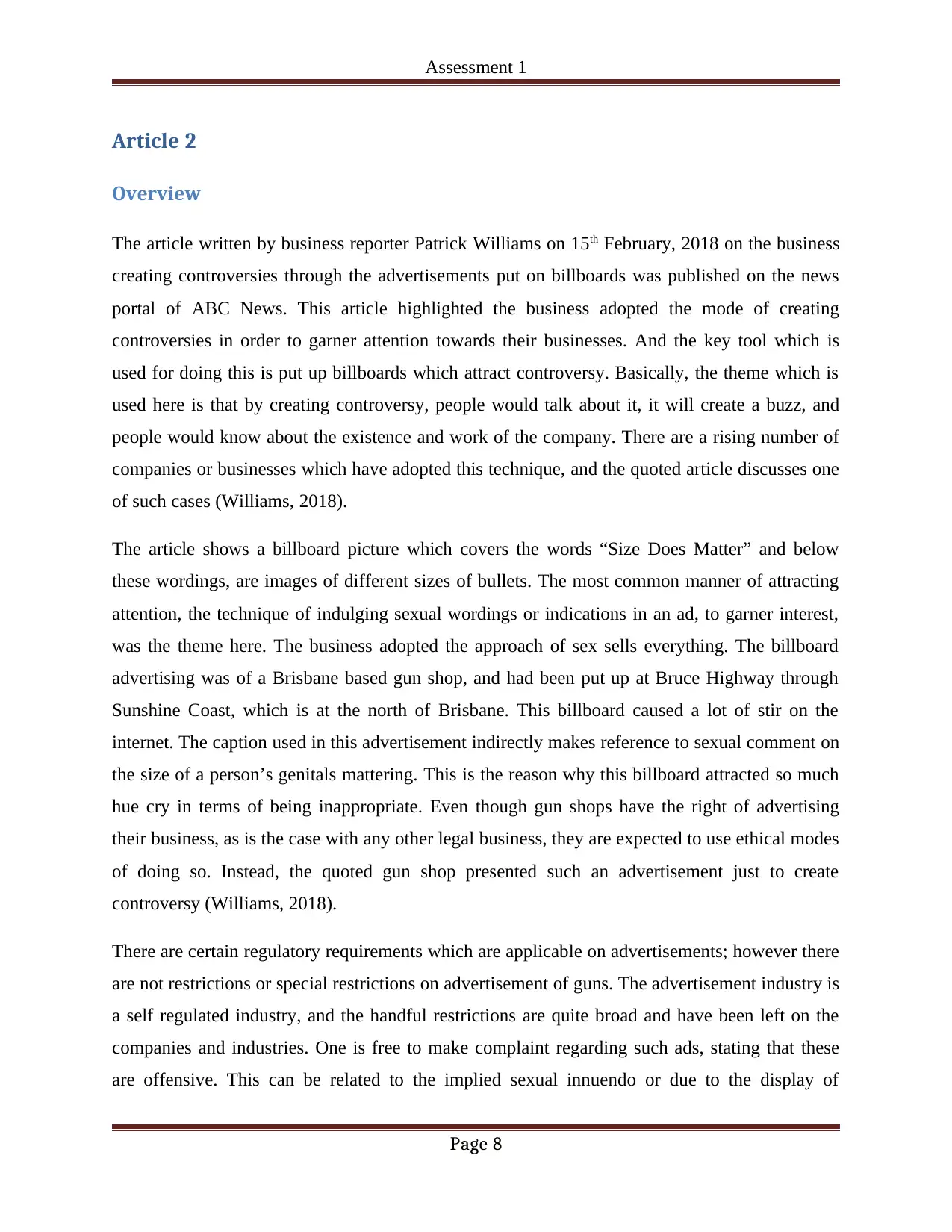
Assessment 1
Article 2
Overview
The article written by business reporter Patrick Williams on 15th February, 2018 on the business
creating controversies through the advertisements put on billboards was published on the news
portal of ABC News. This article highlighted the business adopted the mode of creating
controversies in order to garner attention towards their businesses. And the key tool which is
used for doing this is put up billboards which attract controversy. Basically, the theme which is
used here is that by creating controversy, people would talk about it, it will create a buzz, and
people would know about the existence and work of the company. There are a rising number of
companies or businesses which have adopted this technique, and the quoted article discusses one
of such cases (Williams, 2018).
The article shows a billboard picture which covers the words “Size Does Matter” and below
these wordings, are images of different sizes of bullets. The most common manner of attracting
attention, the technique of indulging sexual wordings or indications in an ad, to garner interest,
was the theme here. The business adopted the approach of sex sells everything. The billboard
advertising was of a Brisbane based gun shop, and had been put up at Bruce Highway through
Sunshine Coast, which is at the north of Brisbane. This billboard caused a lot of stir on the
internet. The caption used in this advertisement indirectly makes reference to sexual comment on
the size of a person’s genitals mattering. This is the reason why this billboard attracted so much
hue cry in terms of being inappropriate. Even though gun shops have the right of advertising
their business, as is the case with any other legal business, they are expected to use ethical modes
of doing so. Instead, the quoted gun shop presented such an advertisement just to create
controversy (Williams, 2018).
There are certain regulatory requirements which are applicable on advertisements; however there
are not restrictions or special restrictions on advertisement of guns. The advertisement industry is
a self regulated industry, and the handful restrictions are quite broad and have been left on the
companies and industries. One is free to make complaint regarding such ads, stating that these
are offensive. This can be related to the implied sexual innuendo or due to the display of
Page 8
Article 2
Overview
The article written by business reporter Patrick Williams on 15th February, 2018 on the business
creating controversies through the advertisements put on billboards was published on the news
portal of ABC News. This article highlighted the business adopted the mode of creating
controversies in order to garner attention towards their businesses. And the key tool which is
used for doing this is put up billboards which attract controversy. Basically, the theme which is
used here is that by creating controversy, people would talk about it, it will create a buzz, and
people would know about the existence and work of the company. There are a rising number of
companies or businesses which have adopted this technique, and the quoted article discusses one
of such cases (Williams, 2018).
The article shows a billboard picture which covers the words “Size Does Matter” and below
these wordings, are images of different sizes of bullets. The most common manner of attracting
attention, the technique of indulging sexual wordings or indications in an ad, to garner interest,
was the theme here. The business adopted the approach of sex sells everything. The billboard
advertising was of a Brisbane based gun shop, and had been put up at Bruce Highway through
Sunshine Coast, which is at the north of Brisbane. This billboard caused a lot of stir on the
internet. The caption used in this advertisement indirectly makes reference to sexual comment on
the size of a person’s genitals mattering. This is the reason why this billboard attracted so much
hue cry in terms of being inappropriate. Even though gun shops have the right of advertising
their business, as is the case with any other legal business, they are expected to use ethical modes
of doing so. Instead, the quoted gun shop presented such an advertisement just to create
controversy (Williams, 2018).
There are certain regulatory requirements which are applicable on advertisements; however there
are not restrictions or special restrictions on advertisement of guns. The advertisement industry is
a self regulated industry, and the handful restrictions are quite broad and have been left on the
companies and industries. One is free to make complaint regarding such ads, stating that these
are offensive. This can be related to the implied sexual innuendo or due to the display of
Page 8
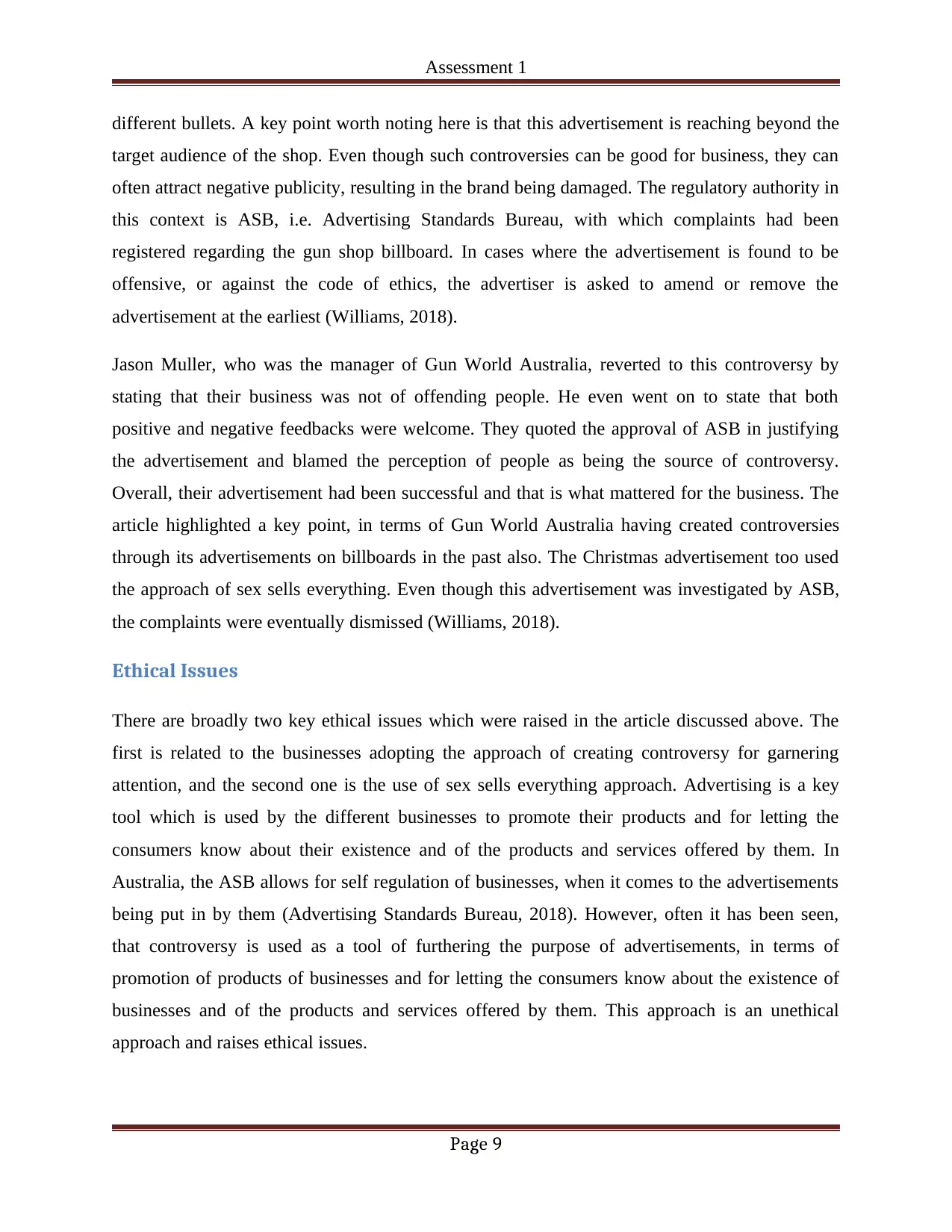
Assessment 1
different bullets. A key point worth noting here is that this advertisement is reaching beyond the
target audience of the shop. Even though such controversies can be good for business, they can
often attract negative publicity, resulting in the brand being damaged. The regulatory authority in
this context is ASB, i.e. Advertising Standards Bureau, with which complaints had been
registered regarding the gun shop billboard. In cases where the advertisement is found to be
offensive, or against the code of ethics, the advertiser is asked to amend or remove the
advertisement at the earliest (Williams, 2018).
Jason Muller, who was the manager of Gun World Australia, reverted to this controversy by
stating that their business was not of offending people. He even went on to state that both
positive and negative feedbacks were welcome. They quoted the approval of ASB in justifying
the advertisement and blamed the perception of people as being the source of controversy.
Overall, their advertisement had been successful and that is what mattered for the business. The
article highlighted a key point, in terms of Gun World Australia having created controversies
through its advertisements on billboards in the past also. The Christmas advertisement too used
the approach of sex sells everything. Even though this advertisement was investigated by ASB,
the complaints were eventually dismissed (Williams, 2018).
Ethical Issues
There are broadly two key ethical issues which were raised in the article discussed above. The
first is related to the businesses adopting the approach of creating controversy for garnering
attention, and the second one is the use of sex sells everything approach. Advertising is a key
tool which is used by the different businesses to promote their products and for letting the
consumers know about their existence and of the products and services offered by them. In
Australia, the ASB allows for self regulation of businesses, when it comes to the advertisements
being put in by them (Advertising Standards Bureau, 2018). However, often it has been seen,
that controversy is used as a tool of furthering the purpose of advertisements, in terms of
promotion of products of businesses and for letting the consumers know about the existence of
businesses and of the products and services offered by them. This approach is an unethical
approach and raises ethical issues.
Page 9
different bullets. A key point worth noting here is that this advertisement is reaching beyond the
target audience of the shop. Even though such controversies can be good for business, they can
often attract negative publicity, resulting in the brand being damaged. The regulatory authority in
this context is ASB, i.e. Advertising Standards Bureau, with which complaints had been
registered regarding the gun shop billboard. In cases where the advertisement is found to be
offensive, or against the code of ethics, the advertiser is asked to amend or remove the
advertisement at the earliest (Williams, 2018).
Jason Muller, who was the manager of Gun World Australia, reverted to this controversy by
stating that their business was not of offending people. He even went on to state that both
positive and negative feedbacks were welcome. They quoted the approval of ASB in justifying
the advertisement and blamed the perception of people as being the source of controversy.
Overall, their advertisement had been successful and that is what mattered for the business. The
article highlighted a key point, in terms of Gun World Australia having created controversies
through its advertisements on billboards in the past also. The Christmas advertisement too used
the approach of sex sells everything. Even though this advertisement was investigated by ASB,
the complaints were eventually dismissed (Williams, 2018).
Ethical Issues
There are broadly two key ethical issues which were raised in the article discussed above. The
first is related to the businesses adopting the approach of creating controversy for garnering
attention, and the second one is the use of sex sells everything approach. Advertising is a key
tool which is used by the different businesses to promote their products and for letting the
consumers know about their existence and of the products and services offered by them. In
Australia, the ASB allows for self regulation of businesses, when it comes to the advertisements
being put in by them (Advertising Standards Bureau, 2018). However, often it has been seen,
that controversy is used as a tool of furthering the purpose of advertisements, in terms of
promotion of products of businesses and for letting the consumers know about the existence of
businesses and of the products and services offered by them. This approach is an unethical
approach and raises ethical issues.
Page 9
⊘ This is a preview!⊘
Do you want full access?
Subscribe today to unlock all pages.

Trusted by 1+ million students worldwide
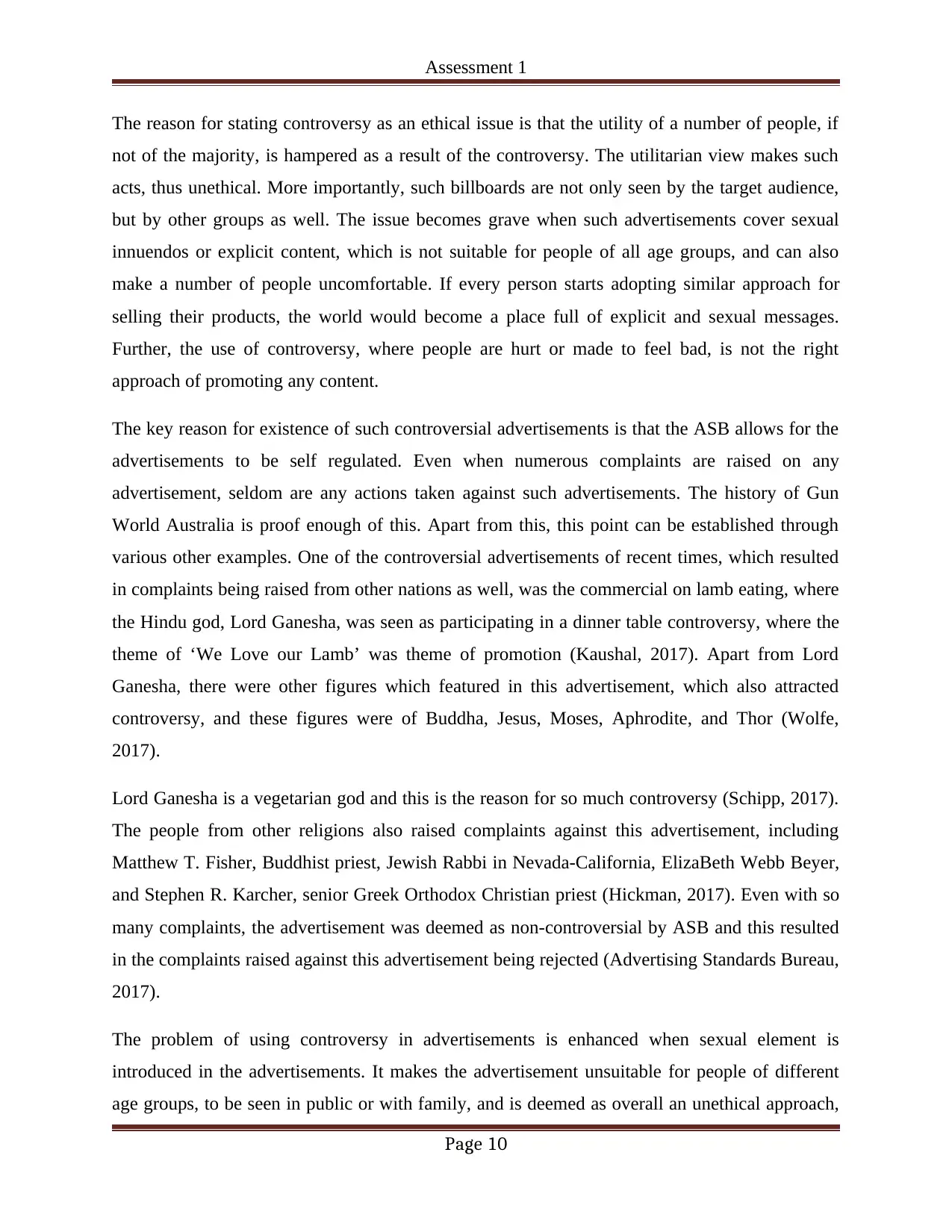
Assessment 1
The reason for stating controversy as an ethical issue is that the utility of a number of people, if
not of the majority, is hampered as a result of the controversy. The utilitarian view makes such
acts, thus unethical. More importantly, such billboards are not only seen by the target audience,
but by other groups as well. The issue becomes grave when such advertisements cover sexual
innuendos or explicit content, which is not suitable for people of all age groups, and can also
make a number of people uncomfortable. If every person starts adopting similar approach for
selling their products, the world would become a place full of explicit and sexual messages.
Further, the use of controversy, where people are hurt or made to feel bad, is not the right
approach of promoting any content.
The key reason for existence of such controversial advertisements is that the ASB allows for the
advertisements to be self regulated. Even when numerous complaints are raised on any
advertisement, seldom are any actions taken against such advertisements. The history of Gun
World Australia is proof enough of this. Apart from this, this point can be established through
various other examples. One of the controversial advertisements of recent times, which resulted
in complaints being raised from other nations as well, was the commercial on lamb eating, where
the Hindu god, Lord Ganesha, was seen as participating in a dinner table controversy, where the
theme of ‘We Love our Lamb’ was theme of promotion (Kaushal, 2017). Apart from Lord
Ganesha, there were other figures which featured in this advertisement, which also attracted
controversy, and these figures were of Buddha, Jesus, Moses, Aphrodite, and Thor (Wolfe,
2017).
Lord Ganesha is a vegetarian god and this is the reason for so much controversy (Schipp, 2017).
The people from other religions also raised complaints against this advertisement, including
Matthew T. Fisher, Buddhist priest, Jewish Rabbi in Nevada-California, ElizaBeth Webb Beyer,
and Stephen R. Karcher, senior Greek Orthodox Christian priest (Hickman, 2017). Even with so
many complaints, the advertisement was deemed as non-controversial by ASB and this resulted
in the complaints raised against this advertisement being rejected (Advertising Standards Bureau,
2017).
The problem of using controversy in advertisements is enhanced when sexual element is
introduced in the advertisements. It makes the advertisement unsuitable for people of different
age groups, to be seen in public or with family, and is deemed as overall an unethical approach,
Page 10
The reason for stating controversy as an ethical issue is that the utility of a number of people, if
not of the majority, is hampered as a result of the controversy. The utilitarian view makes such
acts, thus unethical. More importantly, such billboards are not only seen by the target audience,
but by other groups as well. The issue becomes grave when such advertisements cover sexual
innuendos or explicit content, which is not suitable for people of all age groups, and can also
make a number of people uncomfortable. If every person starts adopting similar approach for
selling their products, the world would become a place full of explicit and sexual messages.
Further, the use of controversy, where people are hurt or made to feel bad, is not the right
approach of promoting any content.
The key reason for existence of such controversial advertisements is that the ASB allows for the
advertisements to be self regulated. Even when numerous complaints are raised on any
advertisement, seldom are any actions taken against such advertisements. The history of Gun
World Australia is proof enough of this. Apart from this, this point can be established through
various other examples. One of the controversial advertisements of recent times, which resulted
in complaints being raised from other nations as well, was the commercial on lamb eating, where
the Hindu god, Lord Ganesha, was seen as participating in a dinner table controversy, where the
theme of ‘We Love our Lamb’ was theme of promotion (Kaushal, 2017). Apart from Lord
Ganesha, there were other figures which featured in this advertisement, which also attracted
controversy, and these figures were of Buddha, Jesus, Moses, Aphrodite, and Thor (Wolfe,
2017).
Lord Ganesha is a vegetarian god and this is the reason for so much controversy (Schipp, 2017).
The people from other religions also raised complaints against this advertisement, including
Matthew T. Fisher, Buddhist priest, Jewish Rabbi in Nevada-California, ElizaBeth Webb Beyer,
and Stephen R. Karcher, senior Greek Orthodox Christian priest (Hickman, 2017). Even with so
many complaints, the advertisement was deemed as non-controversial by ASB and this resulted
in the complaints raised against this advertisement being rejected (Advertising Standards Bureau,
2017).
The problem of using controversy in advertisements is enhanced when sexual element is
introduced in the advertisements. It makes the advertisement unsuitable for people of different
age groups, to be seen in public or with family, and is deemed as overall an unethical approach,
Page 10
Paraphrase This Document
Need a fresh take? Get an instant paraphrase of this document with our AI Paraphraser
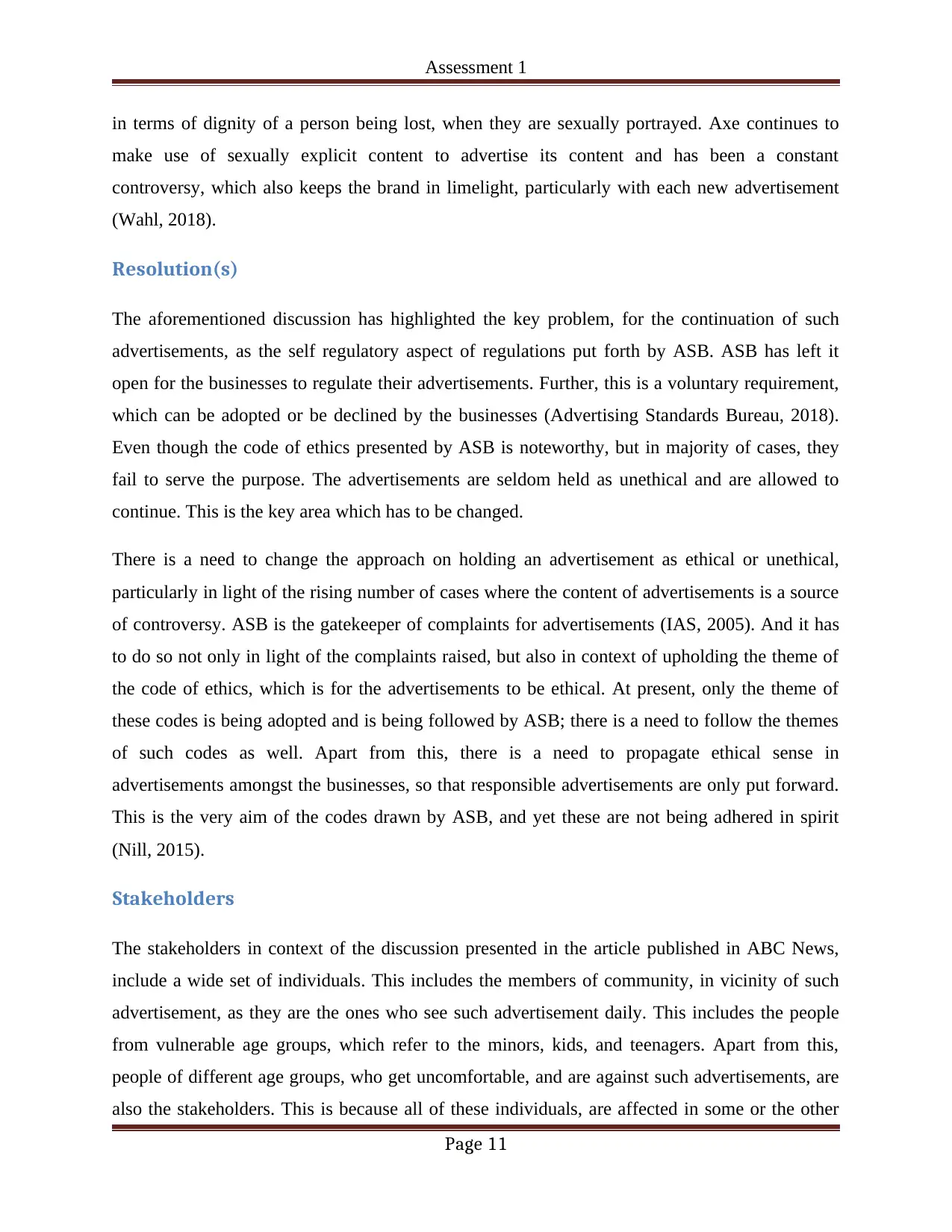
Assessment 1
in terms of dignity of a person being lost, when they are sexually portrayed. Axe continues to
make use of sexually explicit content to advertise its content and has been a constant
controversy, which also keeps the brand in limelight, particularly with each new advertisement
(Wahl, 2018).
Resolution(s)
The aforementioned discussion has highlighted the key problem, for the continuation of such
advertisements, as the self regulatory aspect of regulations put forth by ASB. ASB has left it
open for the businesses to regulate their advertisements. Further, this is a voluntary requirement,
which can be adopted or be declined by the businesses (Advertising Standards Bureau, 2018).
Even though the code of ethics presented by ASB is noteworthy, but in majority of cases, they
fail to serve the purpose. The advertisements are seldom held as unethical and are allowed to
continue. This is the key area which has to be changed.
There is a need to change the approach on holding an advertisement as ethical or unethical,
particularly in light of the rising number of cases where the content of advertisements is a source
of controversy. ASB is the gatekeeper of complaints for advertisements (IAS, 2005). And it has
to do so not only in light of the complaints raised, but also in context of upholding the theme of
the code of ethics, which is for the advertisements to be ethical. At present, only the theme of
these codes is being adopted and is being followed by ASB; there is a need to follow the themes
of such codes as well. Apart from this, there is a need to propagate ethical sense in
advertisements amongst the businesses, so that responsible advertisements are only put forward.
This is the very aim of the codes drawn by ASB, and yet these are not being adhered in spirit
(Nill, 2015).
Stakeholders
The stakeholders in context of the discussion presented in the article published in ABC News,
include a wide set of individuals. This includes the members of community, in vicinity of such
advertisement, as they are the ones who see such advertisement daily. This includes the people
from vulnerable age groups, which refer to the minors, kids, and teenagers. Apart from this,
people of different age groups, who get uncomfortable, and are against such advertisements, are
also the stakeholders. This is because all of these individuals, are affected in some or the other
Page 11
in terms of dignity of a person being lost, when they are sexually portrayed. Axe continues to
make use of sexually explicit content to advertise its content and has been a constant
controversy, which also keeps the brand in limelight, particularly with each new advertisement
(Wahl, 2018).
Resolution(s)
The aforementioned discussion has highlighted the key problem, for the continuation of such
advertisements, as the self regulatory aspect of regulations put forth by ASB. ASB has left it
open for the businesses to regulate their advertisements. Further, this is a voluntary requirement,
which can be adopted or be declined by the businesses (Advertising Standards Bureau, 2018).
Even though the code of ethics presented by ASB is noteworthy, but in majority of cases, they
fail to serve the purpose. The advertisements are seldom held as unethical and are allowed to
continue. This is the key area which has to be changed.
There is a need to change the approach on holding an advertisement as ethical or unethical,
particularly in light of the rising number of cases where the content of advertisements is a source
of controversy. ASB is the gatekeeper of complaints for advertisements (IAS, 2005). And it has
to do so not only in light of the complaints raised, but also in context of upholding the theme of
the code of ethics, which is for the advertisements to be ethical. At present, only the theme of
these codes is being adopted and is being followed by ASB; there is a need to follow the themes
of such codes as well. Apart from this, there is a need to propagate ethical sense in
advertisements amongst the businesses, so that responsible advertisements are only put forward.
This is the very aim of the codes drawn by ASB, and yet these are not being adhered in spirit
(Nill, 2015).
Stakeholders
The stakeholders in context of the discussion presented in the article published in ABC News,
include a wide set of individuals. This includes the members of community, in vicinity of such
advertisement, as they are the ones who see such advertisement daily. This includes the people
from vulnerable age groups, which refer to the minors, kids, and teenagers. Apart from this,
people of different age groups, who get uncomfortable, and are against such advertisements, are
also the stakeholders. This is because all of these individuals, are affected in some or the other
Page 11
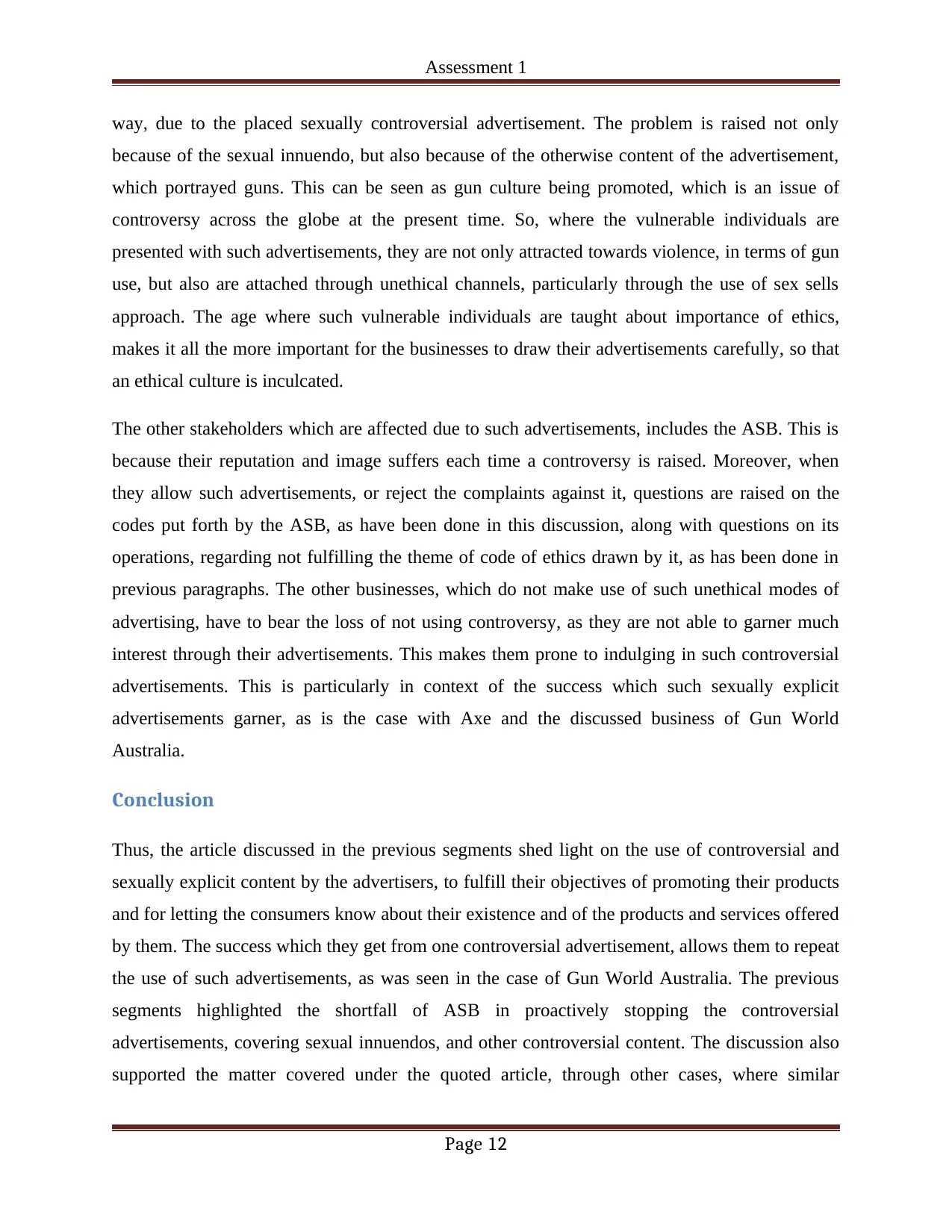
Assessment 1
way, due to the placed sexually controversial advertisement. The problem is raised not only
because of the sexual innuendo, but also because of the otherwise content of the advertisement,
which portrayed guns. This can be seen as gun culture being promoted, which is an issue of
controversy across the globe at the present time. So, where the vulnerable individuals are
presented with such advertisements, they are not only attracted towards violence, in terms of gun
use, but also are attached through unethical channels, particularly through the use of sex sells
approach. The age where such vulnerable individuals are taught about importance of ethics,
makes it all the more important for the businesses to draw their advertisements carefully, so that
an ethical culture is inculcated.
The other stakeholders which are affected due to such advertisements, includes the ASB. This is
because their reputation and image suffers each time a controversy is raised. Moreover, when
they allow such advertisements, or reject the complaints against it, questions are raised on the
codes put forth by the ASB, as have been done in this discussion, along with questions on its
operations, regarding not fulfilling the theme of code of ethics drawn by it, as has been done in
previous paragraphs. The other businesses, which do not make use of such unethical modes of
advertising, have to bear the loss of not using controversy, as they are not able to garner much
interest through their advertisements. This makes them prone to indulging in such controversial
advertisements. This is particularly in context of the success which such sexually explicit
advertisements garner, as is the case with Axe and the discussed business of Gun World
Australia.
Conclusion
Thus, the article discussed in the previous segments shed light on the use of controversial and
sexually explicit content by the advertisers, to fulfill their objectives of promoting their products
and for letting the consumers know about their existence and of the products and services offered
by them. The success which they get from one controversial advertisement, allows them to repeat
the use of such advertisements, as was seen in the case of Gun World Australia. The previous
segments highlighted the shortfall of ASB in proactively stopping the controversial
advertisements, covering sexual innuendos, and other controversial content. The discussion also
supported the matter covered under the quoted article, through other cases, where similar
Page 12
way, due to the placed sexually controversial advertisement. The problem is raised not only
because of the sexual innuendo, but also because of the otherwise content of the advertisement,
which portrayed guns. This can be seen as gun culture being promoted, which is an issue of
controversy across the globe at the present time. So, where the vulnerable individuals are
presented with such advertisements, they are not only attracted towards violence, in terms of gun
use, but also are attached through unethical channels, particularly through the use of sex sells
approach. The age where such vulnerable individuals are taught about importance of ethics,
makes it all the more important for the businesses to draw their advertisements carefully, so that
an ethical culture is inculcated.
The other stakeholders which are affected due to such advertisements, includes the ASB. This is
because their reputation and image suffers each time a controversy is raised. Moreover, when
they allow such advertisements, or reject the complaints against it, questions are raised on the
codes put forth by the ASB, as have been done in this discussion, along with questions on its
operations, regarding not fulfilling the theme of code of ethics drawn by it, as has been done in
previous paragraphs. The other businesses, which do not make use of such unethical modes of
advertising, have to bear the loss of not using controversy, as they are not able to garner much
interest through their advertisements. This makes them prone to indulging in such controversial
advertisements. This is particularly in context of the success which such sexually explicit
advertisements garner, as is the case with Axe and the discussed business of Gun World
Australia.
Conclusion
Thus, the article discussed in the previous segments shed light on the use of controversial and
sexually explicit content by the advertisers, to fulfill their objectives of promoting their products
and for letting the consumers know about their existence and of the products and services offered
by them. The success which they get from one controversial advertisement, allows them to repeat
the use of such advertisements, as was seen in the case of Gun World Australia. The previous
segments highlighted the shortfall of ASB in proactively stopping the controversial
advertisements, covering sexual innuendos, and other controversial content. The discussion also
supported the matter covered under the quoted article, through other cases, where similar
Page 12
⊘ This is a preview!⊘
Do you want full access?
Subscribe today to unlock all pages.

Trusted by 1+ million students worldwide
1 out of 26
Related Documents
Your All-in-One AI-Powered Toolkit for Academic Success.
+13062052269
info@desklib.com
Available 24*7 on WhatsApp / Email
![[object Object]](/_next/static/media/star-bottom.7253800d.svg)
Unlock your academic potential
Copyright © 2020–2026 A2Z Services. All Rights Reserved. Developed and managed by ZUCOL.




